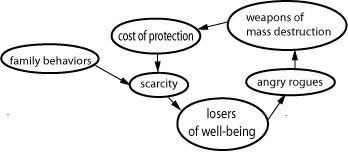Some people feel that invading Iraq was a correct decision. Also that similar actions would be responsible in Iran and Korea if it prevents rogue regimes from creating and using a weapon of mass destruction.
This thinking is not without merit. If we had used this logic with Hitler, (and bombed German industrial plants in the '30's) we could have prevented 20 million W.W.II deaths.
However, we didn't preempt Hitler's war because of, our uncertainty of his intentions, the certainty of deaths created by our strike on civilian manufacturing plants, and the violation of nation sovereignty.
These reservations did not keep us from invading Iraq. The claim was that conditions, were different. Current nuclear and biological weapons can threaten billions of people. We can not afford to let a madman with skill and resources build and deploy weapons for which their is little defense.
Does this mean the decisions to strike Iran and Korea are easier. No they are probably just as difficult. Their military intentions, are vague. The strike would injury civilians, violate sovereignty, destabilize governments and economies, and in the case of Korea, potentially trigger the use of weapons already completed.
Does this mean the decision to wait is easier. No, any madman with resources, and time, will complete and deploy the weapons we most fear.
In the future, weapons of mass destruction will increase in deadly capacity and decrease in cost. The motivation (frustration and desperation) to build and use them will increase. Protecting ourselves from their use will cause us to relinquish more of our personal freedoms and consume more of our productivity.
These circumstances should drive us to understand "what behaviors brought us a history of Adolph’s and Saddam’s, has us facing a belligerent Ayatollah and Kim, and promises a future filled with more madmen."
A search might find that these leaders are the natural products of normal human behavior. When individuals lose previously attained wellbeing, "the loss of well-being" (as opposed to the non-attainment of wellbeing as good as others) motivates individuals to regain their loses - even if it means using force. The forces, used by an Ayatollah or a Kim, are just national/religious consolidations of what their constituents (the losers of wellbeing) are doing or wish to do. Gainers of wellbeing, have little need for extreme nationalism or religion.
If rogue leadership is dependent on nationalism and religion, and these are dependent on the existence and growth of individuals who are "losing wellbeing," we have to understand how the system creates these individuals.
These benign behaviors expand needs. Meeting these needs, without adequate expansion of supplies results in a redistribution of existing supplies which means someone suffers "losses in wellbeing."
Creating losses in wellbeing by benignly creating and providing for children is not a new phenomenon of the present civilization. This process played an active role in our ancestors leaving the rift valley and again when they changed from hunters and gathers to farming.
What is new is that technology has changed the forms of the resulting social conflict. Smaller and smaller groups of people with less and less resources can inflict bigger and bigger injuries on ever more interdependent and thus ever more vulnerable civilizations.
Eventually, one educated person of modest means, will be able to threaten the lives of millions of people in the most powerful nation.
That nation will have no way to prevent it. There will be no way totell which person is going over the edge and become violent about his or her losses of wellbeing. Last week that person was just another unemployed microbiologist or nuclear physicist. Today he or she is a terrorist with immense destructive capacities.
Even if we are lucky enough to stop the existing set of hooligans before one of them can do much harm, our system continues to make individuals who are losing their wellbeing. Eventually, one will become desperate and dangerous.

We must find a new way of having and providing for our families that does not result in the millions of "losers of wellbeing" that exist today and will be created in the future.
We have to respond to the above causal loop which not only controls the creation of "losers wellbeing," but also angry rogues, weapons of mass destruction, rising costs of protection, scarcity, and more losers of wellbeing...
In this loop, each element causes the next element to change. If any element changes the rest successively change. Successive changes around the loop continue without end.
Of course that first element's change can be in the increasing or decreasing direction. Instead of a change of increased scarcity there can be a reduction of scarcity. This results in reduced losers of wellbeing, reduced rogue leadership, reduced WMD, reduced costs of protection and reduced scarcity...
Family behaviors, being the outside the loop "forcing function," can bump even a loop with all of its elements increasing into one that has all of its elements decreasing.
According to this model, If we don't want our civilization to self-destruct like all others before it. If we do not want a dark age from which our species might not immerge, we have to change the driving force created by "our family creating and supporting behaviors" so it pushes the loop in its civilization improving, rather than its civilization destructing direction.
The way to decrease the load each family places on the system is to adopt behaviors that cause rapidly decreasing population. A one child per family behavior will double the peace.
All we need is a thought process that lights the path. Once people see the potential future, they will be attracted to it as they are to the light at the end of a tunnel.
